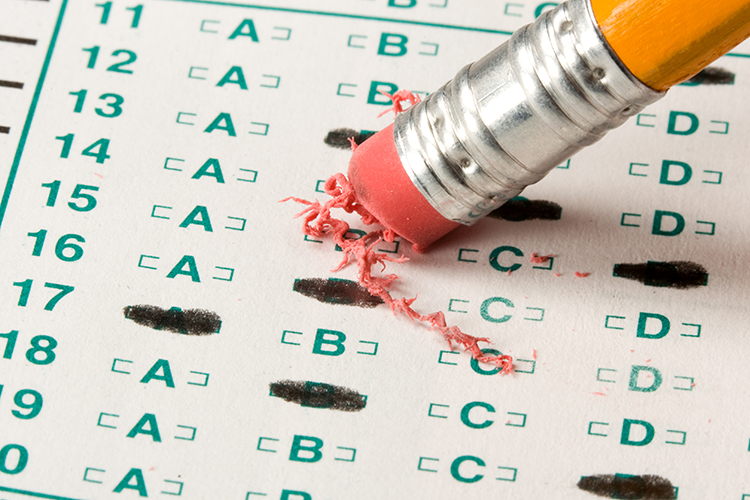Legal Ed will resubmit proposed elimination of admissions-test standard and consider increasing distance ed credits

Image from Shutterstock.
The council of the ABA’s Section of Legal Education and Admissions to the Bar on Friday voted in favor of resubmitting to the House of Delegates a proposal to eliminate a requirement that accredited law schools use an admissions test like the LSAT or GRE.
When the House met at the February midyear meeting, it voted against proposed revisions to Standards 501 and 503 of the ABA Standards and Rules of Procedure for Approval of Law Schools. At the Friday council meeting, which took place in Arizona, the council voted in favor of resubmitting the proposed revisions to the House of Delegates for the 2023 ABA Annual Meeting in August.
Additionally, the council approved a suggestion to allow up to 50% of a law school’s credits offered online, without special permission. That matter is scheduled to go to notice and comment.
Under the existing version of Standard 311, law schools are limited to granting up to one-third of the required credit hours through distance education without council approval.
Regarding the admissions test standards, discussion was part of the council’s public session, but not listed in the agenda. The suggestion came from the council’s strategic review committee.
“Obviously, we respect the House of Delegates. Our feeling on this is that there is more education to be done,” Daniel Theis, chair of the council’s strategic review committee, said Friday.
Under ABA rules, proposed revisions to law school accreditation standards and rules are sent to the House for concurrence up to two times, but the council has the final decision on matters related to law school education.
Discourse around Standard 503 has been plentiful. Initially, it required all ABA-accredited law schools to use the Law School Admission Council’s Law School Admission Test. In 2016, the University of Arizona James E. Rogers College of Law received a variance to accept the Graduate Record Examination, in addition to the LSAT.
A handful of other schools followed suit, and the council of Legal Ed in 2018 brought a resolution to cut Standard 503. It was met with opposition from the Young Lawyers Division and the Minority Network, a group of law school admissions professionals, and was withdrawn shortly before the House vote was scheduled.
Later, in 2021, the council in closed session voted to allow the GRE to be used as an entrance exam, in addition to the LSAT. That addressed an application of the standard, not a revision, and did not require concurrence from the House, according to Bill Adams, ABA managing director of accreditation and legal education.
Regarding the distance education proposals, In February 2022 the council’s strategic review committee surveyed 1,394 third-year law students about distance education. Released in July, the survey found that 68.65% of respondents wanted the ability to earn more distance education credits than what their schools offered.
A Feb. 8 Strategic Review Committee memo details the proposals. Besides the credit increase, it suggests cutting the standard’s 10-credit-hour limit for 1L distance education classes.
According to the memo, the proposal stems from law school and student requests, as well as a U.S. Department of Education rule that only requires accreditor approval for programs with more than 50% of credits offered through distance education.
If the proposed revision is adopted, Standards 105, 306, 313 and 511 would also need to be changed, as well as Rule 24 and the council’s Internal Operating Practices, according to the memo.
Regarding Standard 306, which addresses distance education, the proposed revision suggests adding language that requires schools use the appropriate technology and ensure appropriate support is provided.
According to Theis, it has come to the council’s attention that many law schools with distance education use outside vendors. Another suggested revision to Standard 306 adds language that requires those schools “actively ensure” such offerings are effective and have quality.
In light of the pandemic, in March 2020 the council gave ABA-accredited law schools leeway to offer emergency online classes. Later, 140 schools got extensions to continue with online learning, according to the ABA website. The council has granted substantive change or variance requests for online and hybrid JD programs at 13 law schools.
The applications have continued, according to Theis, and take up a significant amount of time. Included in meeting materials was a suggested distance education application, which schools who wanted such offerings would be required to submit.
“The idea is we would process these much like we did with the variance process during the pandemic,” he said.
In other council business, the group approved proposed revisions for clarification to Standard 307, which addresses studies and field placement outside the United States.
Additionally, the council approved a proposed revision to Standard 509, which focuses on required disclosures, to replace “administrators” with “staff” in the annual questionnaire, for reporting purposes. Both proposals are detailed in a February 8 Standards Committee memo.



